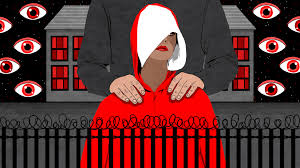Title: “The Handmaid’s Tale: A Dystopian Masterpiece Reflecting Societal Realities”
Introduction:
Margaret Atwood’s novel, “The Handmaid’s Tale,” has captivated readers worldwide with its chilling portrayal of a dystopian society. Set in the near future, the book delves into themes of oppression, gender inequality, and the struggle for freedom. With its thought-provoking narrative and stark social commentary, “The Handmaid’s Tale” serves as a haunting reminder of the importance of vigilance in safeguarding our individual liberties.
Unveiling a Bleak Future:
Atwood paints a bleak picture of Gilead, a totalitarian state formed after a religious extremist group overthrows the United States government. The protagonist, Offred, is one of the few remaining fertile women known as Handmaids. Forced into sexual servitude to bear children for the ruling elite, Offred grapples with her loss of autonomy and yearns for her stolen identity.
Gender Roles and Patriarchy:
One of the most striking aspects of “The Handmaid’s Tale” is its exploration of gender roles and patriarchy. Women are stripped of their rights and reduced to their reproductive capabilities, reinforcing patriarchal control over their bodies. Atwood’s narrative forces readers to confront the consequences when women are reduced to mere vessels for procreation, devoid of agency or personal desires.
Relevance in Today’s World:
While “The Handmaid’s Tale” may be a work of fiction, it resonates deeply with contemporary societal issues. It serves as a stark warning against complacency in defending women’s rights and reproductive autonomy. The novel challenges us to examine power structures that perpetuate inequality and reminds us that progress is not guaranteed.
A Call for Vigilance:
“The Handmaid’s Tale” encourages readers to question authority and remain vigilant against any erosion of civil liberties. Atwood masterfully highlights how seemingly small infringements on individual rights can snowball into a society ruled by fear and oppression. The novel serves as a reminder that the fight for freedom is ongoing and requires constant vigilance.
Cultural Impact:
The impact of “The Handmaid’s Tale” extends beyond the pages of the book. It has spawned a critically acclaimed television series, further amplifying its powerful message. The story’s resonance has sparked discussions on women’s rights, reproductive freedom, and the dangers of extremism. It serves as a catalyst for introspection and prompts us to examine our own society through a critical lens.
Conclusion:
“The Handmaid’s Tale” stands as a testament to Margaret Atwood’s literary prowess and her ability to craft a dystopian narrative that reflects the realities of our world. Through its chilling portrayal of Gilead, the novel urges us to remain vigilant in safeguarding our freedoms and fighting against any form of oppression. As we navigate an ever-changing society, “The Handmaid’s Tale” serves as both a cautionary tale and an inspiration to strive for a future where individual liberties are cherished and protected.
Frequently Asked Questions about “The Handmaid’s Tale” in English (UK)
- Is season 5 Handmaid’s Tale the last season?
- Is there a season 5 of Handmaid’s Tale coming out?
- What is the main point of Handmaid’s Tale?
- Is Handmaid’s Tale A True story?
Is season 5 Handmaid’s Tale the last season?
No, Season 5 of The Handmaid’s Tale is not the last season. The show has been renewed for a sixth season.
Is there a season 5 of Handmaid’s Tale coming out?
As of my last update, there has been no official announcement regarding a fifth season of “The Handmaid’s Tale.” The television series, based on Margaret Atwood’s novel, has gained significant popularity and critical acclaim since its debut. However, it is always best to refer to official sources or news outlets for the most up-to-date information regarding any future seasons or developments of the show.
What is the main point of Handmaid’s Tale?
The main point of “The Handmaid’s Tale” is to shed light on the dangers of totalitarianism, the oppression of women, and the importance of individual autonomy and freedom. Margaret Atwood’s novel serves as a cautionary tale, urging readers to remain vigilant in protecting their rights and to challenge systems that seek to control and suppress individuals. It explores themes such as gender inequality, reproductive rights, and the consequences of a society governed by extreme ideologies. Ultimately, “The Handmaid’s Tale” serves as a powerful critique of oppressive regimes and a reminder of the need for resistance against injustice.
Is Handmaid’s Tale A True story?
No, “The Handmaid’s Tale” is not a true story. It is a work of fiction written by Margaret Atwood and was first published in 1985. While the novel incorporates elements from historical events and societal issues, it is not based on real events or individuals. However, Atwood has stated that she drew inspiration from various historical and contemporary contexts to create a dystopian world that reflects certain aspects of our society.

